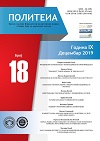Бивствовање уметника/генија у предворјима истине
Being the Artist / Genius in the Presidences of Truth
Author(s): Nataša VilićSubject(s): Visual Arts, Aesthetics, Sociology of Art
Published by: Fakultet političkih nauka Univerziteta u Banjoj Luci
Keywords: Artist; Genius; Art; Truth;
Summary/Abstract: First of all, what interests us in this work is to point out why it is that the artist / genius feels that they are summoned to tell the truth through their work. In fact, one of our goals is to show why the truth of (earthly and extraterrestrial) existence is conveyed to human beings / audience through art. The artist / genius feels that they have this privilege of spending their entire existence in the vestibules of truth. We are also interested in what the artist / genius is, because artists seem to have offered us more answers about the totality of (beyond) being than scientists have done so far. Nature and art, as the two main driving forces, as Aristotle also pointed out to us, enabled, above all, the artist / genius themselves to understand that beauty belongs to every being, only in a metaphysical sense. This realisation influences medieval and, especially, Renaissance artists / geniuses, who know that artistic creation is a pure act of free play in which the universal spirit plays with both the artist / genius and the audience, with a view of realising the “germ of God “. Certainly, every artist / genius is aware of their own boundaries and limitations. Yet, the artist / genius comes to know the truths in the very act of artistic creation, which is their response in order for a human being to overcome their limitations, fears, and transience. The artist / genius, as Tubic also notes, conquers (their own) being. This is possible, as Kant also observes, in the way that the artist / genius makes a spiritual effort to penetrate the transcendental nature in which the unity of emergent experience is clearly demonstrated. It is the artist / genius who has always been the first to point out in their works of art the conditions in the existing culture, that is, in the culture in which their artwork is created. Therefore, the decline in culture has always indicated a crisis in art itself, as Hegel himself has shown, because ‘its form has ceased to be the highest need of the spirit.’ The question of the phenomenon of art is further compounded by the question – to what extent is the artist / genius the source of the work of art, because it (work of art) is what tells us what the artist / genius is? The essence of art is revealed in works of art, and the search for artistic essence is really nothing more than a kind of human defence against the constant fear of transience and mortality. Certainly, no less important to us is the attempt to think the very origins of art. So, with one possible synthesis of the philosophical thinking of Plato and Aristotle on this issue, we come to the realisation that the origin of art lies in the human spirit, but a spirit that is illuminated by the light of knowledge given to human beings by gods (Prometheus), which they later perfected. It is in this constant pursuit of perfection that the artist / genius becomes aware of their own limitations. In such circumstances, they do not stand still, but look for ways to overcome all boundaries and limitations. Thus, it has just been shown that the artist’s search for truth is a way of overcoming the boundaries and limitations that nature has set before human beings themselves.
Journal: Politeia - Naučni časopis Fakulteta političkih nauka u Banjoj Luci za društvena pitanja
- Issue Year: 9/2019
- Issue No: 18
- Page Range: 89-103
- Page Count: 15
- Language: Serbian

